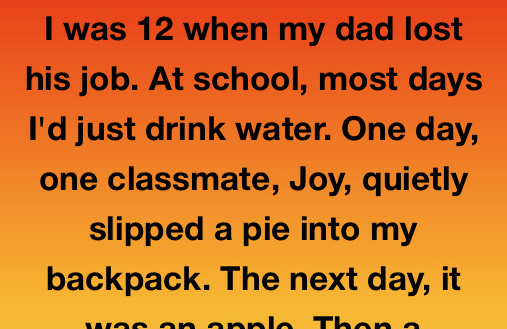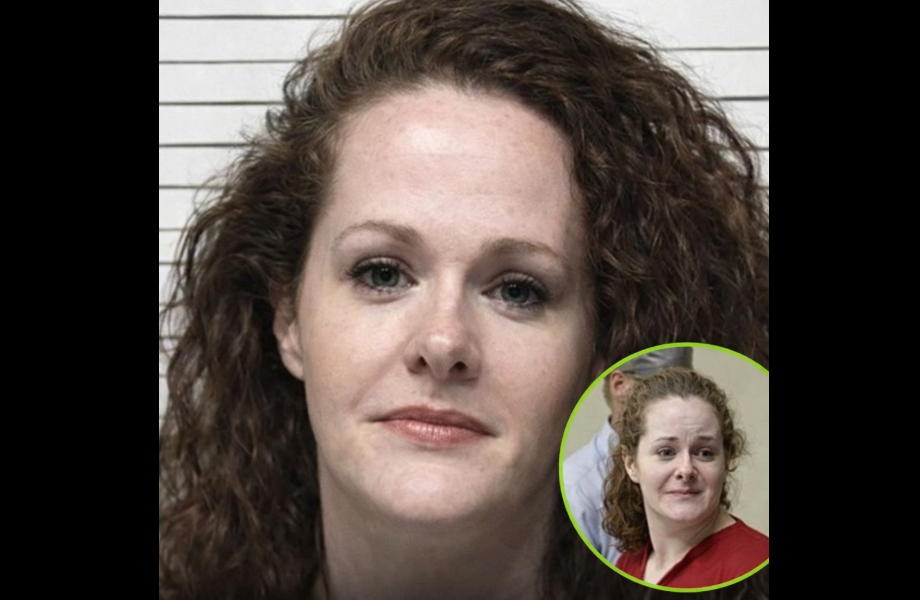At twelve years old, my world shifted when my dad lost his job. School became a place where I sipped water to quiet my hunger. One day, my classmate Joy tucked a pie into my backpack without a word. The next day, an apple appeared. Then a sandwich. It grew into a silent routine. Months later, Joy’s mom welcomed me to their home for dinner. I paused when I recognized her as the grocery store cashier whose warm smile greeted me, even when my pockets were empty.
Her eyes held a gentle spark, always resting on me a moment longer than expected. I had thought it was mere courtesy. But seeing her in the kitchen, stirring a pot of stew with that same radiant smile, everything clicked. She understood my struggle. Somehow, she always had.
That dinner felt like a feast fit for royalty. Not because of the meal—though her homemade stew was unforgettable—but because, for the first time in weeks, my hunger vanished. I could simply be a child, free from pretense.
Afterward, Joy and I sat on their porch as the sun sank, casting the sky in hues of pink and lavender. She handed me a cookie wrapped in a napkin. “Mom says food tastes better when it’s shared,” she said.
I nodded, swallowing the lump in my throat as my eyes stung.
From that day, their family became my haven. Not because they had abundance, but because they shared what they had so generously. Joy’s mom, Miss Ella, never mentioned the food she sent through Joy. She treated it as the most ordinary act. Later, I learned she sometimes skipped her own meals to ensure we both had enough.
At home, life was tough. My dad took on odd jobs—repairing fences, mowing lawns, anything to earn a little cash. My mom cleaned houses. Late at night, I’d overhear their hushed arguments, believing I was asleep. I’d bury myself under blankets, pretending I couldn’t hear.
School passed in a haze. I stayed quiet, finished my assignments, and looked forward to lunch—not for the meal, but for Joy’s presence. Sometimes, she’d slip a note with the sandwich. Playful sketches. Little jokes. Once, she drew a pirate cat swiping a fish, and I laughed so hard I nearly choked on a grape.
Right before summer break, Joy invited me to the community fair. Entry cost a dollar, which I didn’t have. I started to make an excuse, but she waved two tickets in the air. “Dad got them from the mechanic,” she said. “He had spares.”
That fair was pure magic. We rode the Ferris wheel, shared cotton candy, and watched a juggler toss flaming torches. For a few hours, I forgot the strain, the food stamps, the nighttime whispers. I was just a kid again.
But home remained heavy. Our house needed repairs. My dad injured his back hauling heavy loads, and work dried up. One night, I overheard my parents discussing moving to my aunt’s across town. It meant changing schools.
When I told Joy, she fell silent. Then she reached into her backpack and handed me a small envelope. Inside, a five-dollar bill and a note: “For snacks on your first day. You’ll be amazing. – J”
That bill felt like treasure. I wanted to return it, but Joy shook her head. “You’re not alone, okay?”
I still keep that note, tucked inside a book.
Two weeks later, we moved. I didn’t see Joy again for years. I wrote her a letter once, but I didn’t know her new address. Life kept moving, in its way.
High school was challenging. I stayed reserved. We had enough to eat, but money was always scarce. I worked weekends at a car wash to help with bills. College wasn’t an option, but I landed a job at a hardware store after graduation.
I worked diligently, arriving early and learning all I could. Over time, I became assistant manager, then manager. At 25, I received an offer to open a new store branch in another city.
One day, in a new town’s grocery store, the scent of fresh bread and disinfectant stopped me in my tracks. I was grabbing cleaning supplies when I saw her.
Joy.
Older now, her hair pulled back, wearing a simple navy dress. She studied a cereal box like it held the world’s secrets.
I must have stared too long because she looked up. A beat of silence, then, “No way,” she whispered.
I smiled. “Hey, Joy.”
We ended up on the curb outside, talking like old times. She worked at a nonprofit, supporting kids from struggling homes. She was a single mom to a four-year-old named Iris. “We’re doing okay,” she said with a shrug.
I shared my journey—managing the store, leading a team, and keeping her middle-school note.
Her eyes glistened. “You kept it?”
“Of course,” I said. “You gave me hope when I had none.”
We shared a long, wordless hug.
Over the next few months, we reconnected. Coffee after work. Dropping off supplies at her center. Iris took a liking to me, and I’d help her stack cereal boxes into towers or teach her to balance coins.
Joy never asked for help. But one rainy evening, I invited her to dinner.
We talked for hours—about old memories, our parents, how life unfolded. Her mom had passed, but not before Joy told her how her quiet kindness shaped my life.
“She always said you were special,” Joy said, smiling. “She saw it first.”
Driving home, I thought about how small gestures can alter someone’s path. A sandwich. A smile. A note.
Two years later, Joy and I married in a small park beneath a towering oak. Iris, our flower girl, skipped down the aisle, tossing petals and giggling.
Our wedding was simple but perfect.
Now, I manage my own store. We live in a cozy house with a creaky porch and a big yard where Iris chases butterflies. Joy still works at the center, and every Friday, we host a dinner called “Ella’s Table” for kids in the program.
Each child leaves with a packed lunch for the next day. A sandwich. An apple. Sometimes a note.
One evening, a quiet boy named Malik pulled me aside after dinner. “Did you ever go without food?” he asked.
I nodded. “Yeah, buddy. I did.”
He stared at his shoes. “I thought I was the only one.”
“You’re not,” I said. “You never are.”
That night, I packed his lunch myself.
Years from now, Malik might forget my words. But I hope he remembers the feeling—that someone saw him, someone cared, without fanfare.
Life loops back in beautiful ways. The kindness Joy and Miss Ella showed me didn’t just fill my stomach. It nourished my spirit, giving me courage to believe in brighter days.
And those days came.
Not overnight. Not with fanfare. But step by step.
Here’s the heart of it: You can’t always see someone’s struggles. The kid who skips lunch. The single mom at the bus stop. The coworker who’s always weary.
One person can change everything. Not with loud gestures, but with quiet care. A pie. An apple. A sandwich. A note.
Miss Ella never amassed wealth. But her legacy of love is priceless.
If you’ve been that hungry kid, or the one who gives without seeking praise, your story matters.
You might be the answer to someone’s silent prayer.
If this story touched you, please share it. You never know who needs to know they’re not alone.






